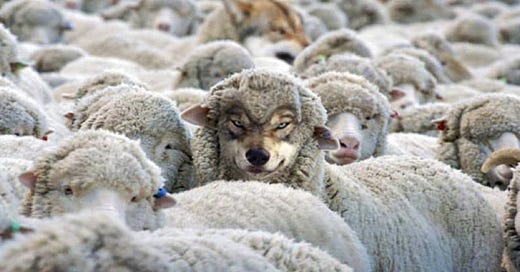Cultural appropriation: Why wolves wear sheep’s clothing
Evil is only powerful when its face is hidden and its name goes unspoken. From Matthew 7 and Aesop, a story on why we pretend.
Matthew 7:15: “Watch out for false prophets. They come to you in sheep’s clothing, but inwardly they are ferocious wolves.”
If the sheep saw a wolf among them, they would scatter. Maybe the wolf would catch one of them. Maybe none. The herd could survive a wolf who announced its intention — that’s what it’s designed to do.
Hence the costume. This is cultural appropriation in the animal kingdom.
The wolf pretends for the same reasons we pretend. For the same reason people who are not claim to be priests or doctors, for the same men who are not tall claim to be in online dating profiles: because we want what those people have, without having to have it.
It’s easier to fake it than make it. Who wants to go the long, hard way? And maybe never get there?
The wolf hunting the sheep, and the sheep trying to escape, is God’s plan. The parts match.
Sometimes the wolf eats, and sometimes the sheep gets away. On it goes.
But the wolf dressing as the sheep, using brainpower rather than fangs and speed, and killing many sheep rather than one — killing more than it needs to eat — is perverse.
It’s not sporting, it’s bloodsport.
By wearing their coat, by blending in and bleating along with them — or at least, not barking — a wolf in sheep’s clothing can badly damage a flock. He can catch them in their slumber, in large numbers. By the time anyone knows the truth, it’s too late.
Evil works in the same way.
It wears a coat that looks like yours, at first glance. It uses values that sound like yours. Aren’t you accepting?
Every believer has been subject to the Fortune Cookie Jesus of our friends’ imaginations, the one who sings for Nirvana when he’s not posing for paintings, and implores us to “come as you are.”
They’d have us to believe faith needs to change for us, and not us for it. Again, this is perverse.
Evil’s message is spread by people who look like you. Maybe you even share a home with them.
By the time you know the truth, it’s too late. Irreversible damage has been done. The flock has been gutted.
In the black community, we have a phrase for that: “All skin folk ain’t kinfolk.”
It’s an admission that friend and foe can only rightly be decided by the content of our character. It challenges our urge to give a ‘hometown discount,’ and instead choose our people by behavior and values. Rather than traits that could just as easily owe to the tanning salon as birth.
Aesop’s Fables tells the story of the wolf in sheep’s clothing differently. As so often happens to the cunning, the wolf’s plan backfires.
Rumi, and Proverbs, warned us of setting traps for others — lest we fall in ourselves.
At first, the scheme works and the wolf lures a sheep to its death.
But before he can get to the full flock, the shepherd wants mutton — and the wolf is the one chosen. This, too, is God’s plan, an exercise of human dominion over the animal world.
The wolf is the only one playing out of position. In both the Bible and Aesop, the wolf subverts God’s design.
The wolf is “ferocious,” as Matthew 7:15 describes. Not “cunning,” like the serpent in Genesis 3.
CS Lewis wrote that “all mortals turn into the thing they are pretending to be.”
That may be sadder than the death itself — that a wolf would die the death of a sheep, led passively to his end. When we pretend to be something else, we get disconnected from our nature. Where did those fangs go?
The wolf had pretended so long to be a sheep that in his life-or-death moment, he didn’t have enough beast left in him to survive.
Pretend to be a sheep, and you run the risk of slaughter.
Dear Reader: If you have fangs, this is the time to use them.
Soon, it might be too late.





